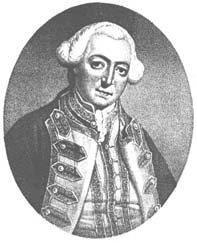

Admiral Edward Boscawen (1711-1761) was born in Cornwall, at Tregothnan near Falmouth, the second son of Hugh, 1st Viscount Falmouth. Edward Boscawen joined the navy at the age of twelve, and was a captain at 26, and a Rear Admiral at 36. Boscawen was known as "Old Dreadnought" to some, "Wry-necked Dick" to others. He has been described as "offensively minded and a courageous leader." He married and had 5 children.
His career in the Royal Navy covered many sea battles, particularly against the French.
Edward Boscawen's first ship was the Superbe (60 guns) on 3 April 1726. He was only 12 then, but this was "normal" for boys who were embarking on a naval career - it gave them seniority. He was appointed a midshipman 19 months later while serving in the West Indies and promoted to lieutenant in 1732. His first command was the 20-gun Leopard on 12 March 1737. He was commanding the Shoreham (20 guns) in the West Indies when the War of the Austrian Succession (1740—1748) began. And he was involved in the siege of Porto Bello (Portobello, Panama) and Cartagena (Colombia) when he was promoted to the command of the 64-gun Prince Frederick. In March 1741, he led a party of seamen to take a battery at Porto Bello of fifteen 24-pound cannon, while exposed to the fire of another fort. He returned to England in May 1742, the Prince Frederick anchoring at St. Helen's after a passage of nine weeks from Jamaica.
On his return to England in 1742 he married Frances Evelyn-Glanville. and entered Parliament as member for Truro. Bit strange to the modern eye, entering parliament in the middle of a war and commanding naval warships.
At age 33 he became the captain of the Dreadnaught, a 60 gun ship. Back at sea in 1744 he captured the French frigate Médée, commanded by M. de Hocquart, the first ship taken in the war. In May 1747 in the first Battle of Finisterre he was wounded in the shoulder with a musket-ball. Hocquart again became his prisoner, and all ten French ships were taken.
On July 1747 15 he was made rear-admiral and commander-in-chief of the expedition to the East Indies. On July 29, 1748 he arrived off Fort St David's, and soon after laid siege to Pondicherry; but the sickness of his men and the approach of the monsoons led to the raising of the siege. Madras was surrendered to him by the French, when peace was declared.
In April 1750 he arrived in England, and was the next year made one of the lords of the Admiralty, and an elder brother of the Trinity House. He stayed in England for the next five years, during which time he was at the centre of political and naval affairs.
Immediately before and during the Seven Years' War (1756–1763), Boscawen's successes continued. In February 1755 he was appointed vice-admiral, and in April he intercepted the French squadron bound to North America, and took the Alcide and Lys of sixty-four guns each. Hocquart became his prisoner for the third time, and Boscawen returned to Spithead with his prizes and 1500 prisoners. For this exploit, he received the thanks of Parliament.
1757 he was a Vice Admiral of the Red. As the commander-in-chief at Portsmouth, it would have been Boscawen who would have signed the order for the execution of Admiral Byng.
In 1758 he was appointed admiral of the blue and commander-in-chief of the expedition to Cape Breton, when with General Amherst, he took the Fortress of Louisburg, and the island of Cape Breton - again he received the thanks of the House of Commons. In Nova Scotia, Governor Charles Lawrence invited Boscawen to attend the colonial council, and he may have been involved in the decision that led to the Great Expulsion of 10,000 Acadians in 1755.
Boscawen's greatest victory came in 1759. France was planning to send an invasion force from Brest, but needed to rendezvous its fleet to protect the force during the crossing. Being in command in the Mediterranean, Boscawen pursued the French fleet, commanded by M. de la Clue, and after a sharp engagement in the Battle of Lagos took three large ships and burnt two, returning to Spithead with his prizes and 2000 prisoners. The victory prevented France from assembling a fleet to cover their invasion.
In December 1760 he was appointed general of the marines, with a salary of £3000 per annum, and was also sworn a member of the Privy Council.
Admiral Boscawen died of a fever in 1761 and is buried in a tomb in St. Michael's churchyard, Penkivel, near Truro, Cornwall. His tomb carries an impressive inscription, with "ardent zeal" and "successful valour, he served his country ... with the highest exertions of military greatness he united the gentlest offices of humanity ... died of a fever [during] ... the 50th year of his age [1761] at Hatchlands Park, in Surrey, a seat he had just finished (at the expense of the enemies of his country); and (amid the groans and tears of his beloved Cornishmen) was here deposited."
The town of Boscawen, New Hampshire is named after him.
Return to Famous Cornwall people